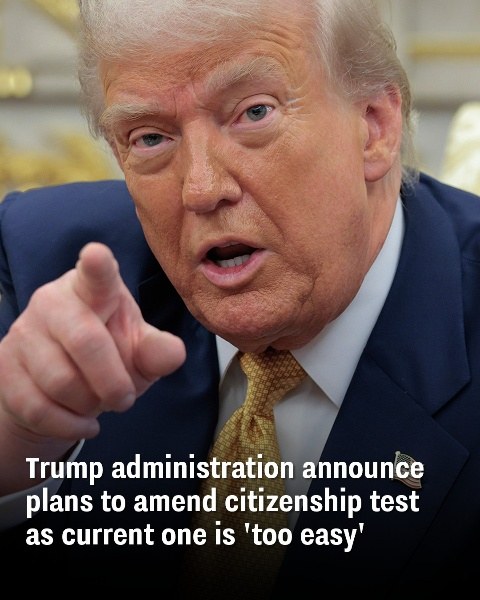Officials in the Trump administration plan to revise the citizenship exam, stating the current test is ‘too easy.’
The Trump administration is once again planning to raise the difficulty level of the U.S. citizenship test, arguing that the current version is too simplistic to adequately assess an applicant’s understanding of American civics. Officials contend that the existing test can be easily passed through rote memorization, allowing individuals to gain citizenship without truly grasping the foundational principles of the United States. According to administration officials, this undermines the intent of the naturalization process, which is meant to evaluate meaningful civic knowledge and engagement.
Joseph Edlow, the director of U.S. Citizenship and Immigration Services (USCIS), has been vocal in his criticism of the current test format. In an interview with the New York Times, Edlow asserted that a memorization-based approach does not reflect the law’s intent, nor does it align with the goal of cultivating informed citizens. He emphasized the need for reforms that go beyond surface-level answers and instead measure a deeper understanding of the country’s history, government, and democratic values. These changes, he argued, would better serve national interests by ensuring new citizens are truly prepared for civic participation.
Historically, the citizenship test lacked standardization, varying across different regions and officers. It was not until the administration of President George W. Bush in 2008 that the test was formally restructured. That version required applicants to correctly answer six out of ten civics questions during a naturalization interview. However, during President Trump’s first term, the test underwent significant changes. It was expanded to 128 questions, with applicants required to answer at least 12 out of 20 correctly. Critics argued the new version was unnecessarily complex and discouraged eligible immigrants from applying for citizenship.
Upon taking office, President Biden reversed those changes in 2021, returning to the previous, simpler test format to reduce barriers for immigrants navigating the naturalization process. Now, under renewed leadership aligned with Trump’s immigration vision, USCIS has announced plans to reintroduce the more demanding version of the test, indicating a broader return to tougher naturalization standards.
The citizenship test is not the only area under review. Edlow also signaled potential reforms to the H-1B visa program, which permits U.S. employers to temporarily employ foreign workers in specialty occupations. He criticized the way some businesses use H-1B hires as a cost-cutting strategy, often at the expense of American workers. As part of the proposed changes, Edlow said the program would be restructured to prioritize highly skilled, well-compensated workers whose expertise brings measurable economic value to the country. This shift would mark a departure from past practices that favored volume and speed in visa issuance.
Together, these policy moves reflect a broader philosophy underpinning the Trump administration’s approach to immigration—one centered on raising standards, increasing scrutiny, and emphasizing self-reliance and contribution. By tightening the requirements for both citizenship and work-based visas, the administration aims to shape an immigration system that favors individuals perceived as deeply invested in the civic life and economic strength of the United States.
While supporters of the changes say they promote accountability and national cohesion, critics argue they create unnecessary obstacles and discourage immigrants from pursuing legal pathways to citizenship. As the debate continues, the future of U.S. immigration policy remains a defining issue in the national conversation.




